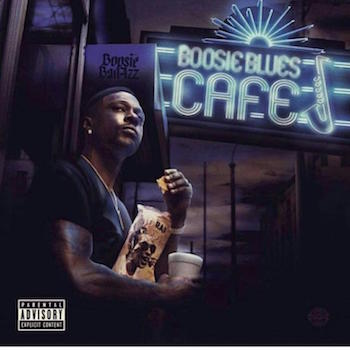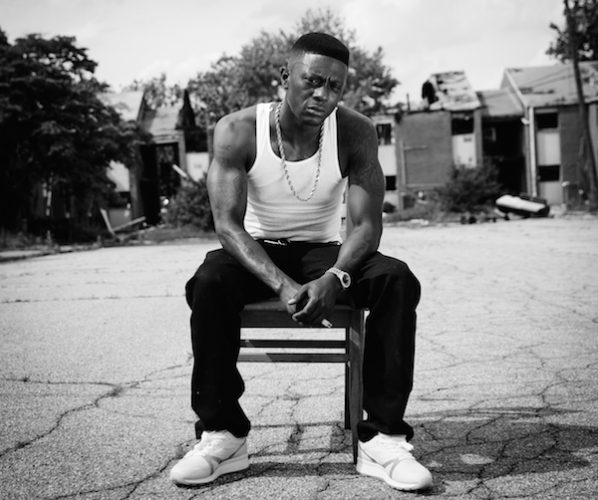CD Review: “Boosie Blues Cafe” — Rap Reaches Back to the Past
By Jeremy Ray Jewell
How will others in the Southern hip-hop scene react to this embrace of tradition by a Southern rapper with his feet firmly in Gangsta Rap?

We all spent some time during Thanksgiving looking for distraction from the typical holiday unpleasantries. Our phones are refuges and, if you’re like me, checking on Spotify for the new Boosie Badazz album was your drug of choice. The rapper from Baton Rouge, Louisiana decided to drop a full-length blues album on the holiday, and only gave a couple of days’ notice.
About a decade has passed since Boosie appeared on Zydeco musician Keith Frank’s track “Haterz” on his Loved. Feared. Respected. album. This established Boosie’s affinity for the traditional genres of his native Louisiana. Frank and his contemporaries like Chris Ardoin are no Clifton Chenier; they regularly embrace modern influences, use Pro Tools, and don’t hesitate to autotune. Moreover, they frequently fuse Zydeco with Southern soul — a fusion most associated with the artist Kenne’ Wayne. So, why eagerly anticipate this Boosie Badazz Blues album?
It should go without saying that the LP would carry a heavy “Southern soul” vibe, because the genre has become synonymous with “today’s Blues” in the Deep South, circles in which Boosie flourishes. Those hoping that Boosie might be coming out with a low-fi, front porch sound — like his fellow Angola State Penitentiary alumnus Lead Belly — prepare for a let-down. Boosie Blues Cafe is influenced by Bobby Rush rather than Howlin’ Wolf.
That being said, this is not purely a Southern soul album, either. And that becomes somewhat problematic. “I Know How to Have a Good Time” features Zydeco rhythym and accordion. For those seeking the old school fix, “I’m on My Way” sounds reminiscent of R. L. Burnside’s “Goin’ Down South” from the 1968 George Mitchell recordings. Lyrically, its influence is doubly clear: “On my way to Mississippi / Where everybody love me like whiskey / On my way to Alabama / had to stop in Louisiana / to get the right hot sauce with my chicken.” Reflecting the bluesmen of yore, hard traveling and an imposing sense of locale saturate the storyline. Also, as in the past, the music jabs at racial norms: “Out there in Kentucky / Where all the fine white girls love me.”
Perhaps no track on the album captures the mixed spirit of Boosie Blues Cafe more than “Love Yo Family.” There’s some musical resemblance to the Isley Brothers a la “Between the Sheets,” so one could easily imagine this might be the first track on amulti-generational Boosie family Thanksgiving get-together. Heart-warming comedy is present throughout: “Sweet potato pie stepped on (Ol’ grandma did her thang) / Granny put her feet in it (I’m takin a coupla these pies home, straight up).” The lyrics invite us to a series of homegrown celebrations — shindigs that serve up moonshine, pot, potato salad, sucking crawfish heads, and dice shooting.

Boosie Badazz – in this album he models himself on the bluesmen of yore. Photo: courtesy of the artist.
There are other efforts here whose domesticity suggest that Boosie Badazz may be sounding a slightly satirical note. “Soul Snatcher” makes for a nice, smooth soul serenade — though one is left confused about how the romantic mood survives the odd reference to fellatio. Boosie’s rap persona doesn’t smoothly accommodate macho and delicacy. Incongruities in this and other songs create some uncertainty — are we supposed to admire the braggadocio or appreciate the deft seductive moves? The net effect is comic, whether Boosie intends it or not.
“That’s Mama” praises motherhood. The tune is clearly heartfelt, but remains open-ended as to whether that esteem extends from Boosie’s mother to other females. Boosie’s perception of the world and women remains, as befits the rapper’s dark rep, ambiguous. For example, “Where I’m From” is set the slums of Baton Rougue, Louisiana. “Fuck 12” (police) is chanted as we are told of a man gunned down by police in front of his son. “No mercy,” Boosie reminds us, “can’t even trust yo lady.”
On one level, Boosie Blues Cafe is my Beans Greens Potatoes Tomatoes for 2018. The album provides some feel-good holiday moments — tradition without any delusions. But it raises a larger question: is it a top-shelf item in the Blues or Southern soul canon? I doubt it. It will certainly remain an interesting entry in Boosie’s catalog, and one which he might reprise in the future. Even more intriguing is how others in the Southern hip-hop scene will react to this embrace of tradition by a Southern rapper with his feet firmly in Gangsta Rap. The message in “That’s Mama” is one of interdependence: when people start connecting dots — like, say, among generations of music — then the bigger picture gathers strength. Tradition is a powerful thing which can unite, past with present, your mama with my mama, your family with my family. You get the feeling that, deep down, Boosie Badazz knows that.
Jeremy Ray Jewell is from Jacksonville, Florida. He has an MA in History of Ideas from Birkbeck College, University of London, and a BA in Philosophy from the University of Massachusetts Boston. He maintains a blog of his writings entitled That’s Not Southern Gothic.
Tagged: Boosie Badazz, Boosie Blues Cafe

